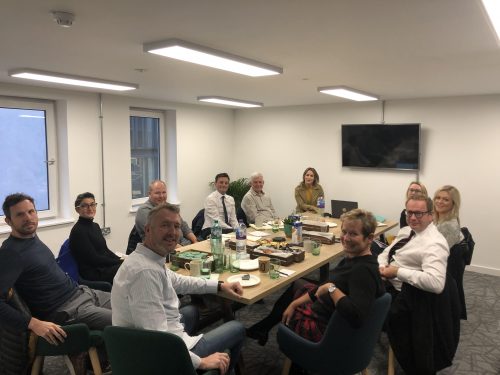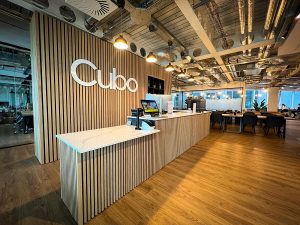Round table: Are offices the thoroughfares of the future?

Despite the revolution that technology has brought to the workplace, the office remains at the heart of business life.
How do company leaders make sure they are making the most of this critical asset?
What makes a successful office and how should you approach a fit-out project?
Our panel came together to discuss these questions and more.
How should you approach an office fit-out?
Amy Revell: A successful office should be the same as a kitchen at home; it should bring all the different elements of your team together so that they can build a rapport.
John Morgan: When planning a new office or a re-fit there needs to be more of a focus on getting the entire team’s perspective. When people are spending the majority of the working life together they should have more of a say in the environment they’re going to be together in.
Daniel Lacey: It’s great that there’s now also more of a focus on mental health in the workplace. Employers should give people a choice as to whether they want to be in the middle of people or in their own headspace.
Mark Wood: For me, it’s about attracting talent to gain advantage on your competitors. Our new office was designed with collaborative working in mind and it’s a much better way of operating than we had at our old place.
Ian Cromie: Having pride in where you work is very important – especially among millennials.
Peter Hind: You have to be careful, though, that your office doesn’t become “too good”! You don’t want your staff inviting people in who might see sensitive material.
Susan Hallam: We’ve found that we’ve had clients who want to come in and work in our offices when they’re in the area – and that’s great for building relationships.
Cromie: We ask staff what they want from the office on a regular basis – they think of things that we never would.
Becky Valentine: Getting the balance between what millennials and what more experienced staff want is crucial when both sets of people will spend massive amounts of time in the same space.
Lacey: I think culture is also important – if not more so. You can have the best office in the world, but if you don’t take into account aspects such as location then it isn’t going to work for people.
Steve Powell: Workspace isn’t a simple property offer for us. It grew out of our parent company, Blenheim Chalcot, thinking very carefully about the space requirements of its portfolio businesses, who are focused on disruptive digital technologies. They look for stimulating, open environments where people can collaborate. So that is what we have created in Nottingham, where there are a number of Blenheim Chalcot businesses.
Izzy Rhodes: If you have graduates, they want perk central. But it really does depend on who is working in the company. Older workers – especially those with children – don’t want to stay at work after hours for a drink.
Victoria Green: The majority of our tenants have come from serviced offices and I think they’re attracted to our space because we’re not trying to be something we’re not. It’s about working with people to discover what they want from an office space.
Valentine. Exactly. We supply the space and then ask people what they want from it.
Revell: Engagement is the most important thing to consider when considering transforming an office. Interpreting vision is crucial and staff consultation is crucial. Business owners need a full landscape view from the entire business before they push ahead with such an important project
How does flexible working fit into all this?
Hallam: We actively encourage remote working – we’re a company of digital nomads and we use the right tech to keep them engaged.
Wood: For me it’s not where you’re sat; it’s about getting the job done. We also use tech to keep people engaged. In many ways, the office has become a thoroughfare.
Valentine: Hierarchy has to go in offices. You can’t have a room where the boss sits and no-one else is allowed in. If you have remote workers, they need to be able to come in and feel as though they can sit and work anywhere.
Powell: We never stop thinking about the workplace environment and we’re now developing its next evolution, Scale Space, in London. This will be a collaboration between Blenheim Chalcot and Imperial College and it reflects our belief that bringing the best research, talent and business-building expertise together is going to deliver transformational gains. We think it’s a model that can be repeated elsewhere in the country.
Revell: Before you embark on an office transformation, make sure you understand how you business utilises every piece of space. This goes right down to what people do at their desks; ask yourself: what is their physical task?
Panel:
Amy Revell, Absolute Commercial Interiors
Susan Hallam, Hallam Agency
Izzy Swain, Swain Architecture
Victoria Green, Spenbeck
Becky Valentine, Spenbeck
Andrew Blackwood, Adtrak
John Morgan, Leonard Design
Peter Hind, RDC Performance
Daniel Lacey, DL Design Studio
Steve Powell, Accelerate Places
Ian Cromie, Adtrak









